(Strand)om Stories: X-Men: Wolverine/Gambit Review
This Loeb/Sale series makes Sale's work look as wonderful as ever, but it falls short in terms of engaging storytelling
—by Nathan on November 6, 2025—
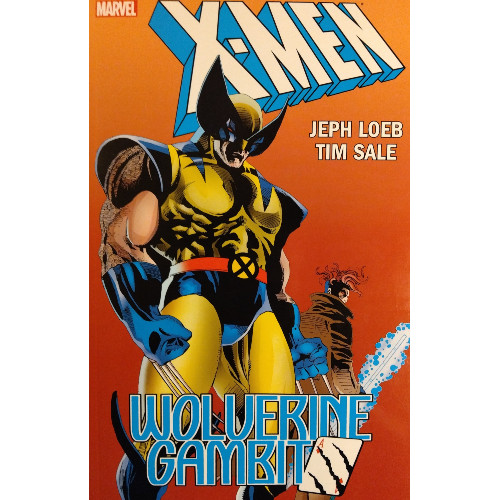
If you're familiar with your superhero cinematic history, you're probably aware that Hugh Jackman's Wolverine has interacted with on-screen versions of the Cajun card-carrier Gambit on two separate occasions: the first came courtesy of the (in my own estimation, somewhat unfairly) much-maligned X-Men Origins: Wolverine, where Gambit was played by Taylor Kitsch. Channing Tatum, after years of having his own solo Gambit movie stuck in developmental limbo, eventually portrayed the X-Man–complete with comic accurate costume–in the MCU's Deadpool vs. Wolverine and is set to reprise his role in 2026's Avengers: Doomsday.
In the comics, the pair's history goes back a bit further–research indicates at least one narrative retroactively placed Gambit in the Weapon X facility at the time of Logan's escape. I'm not terribly familiar with Remy le Beau as a character and am unaware as to how well he generally gets along with Logan. I wouldn't pair them the same way I would Nightcrawler and Colossus or Iceman and Beast (though, to be fair, my general X-Men knowledge ends somewhere in the mid-80s and has several gaps following). So I can't say that Jeph Loeb and Tim Sale, in early work they did for Marvel together, picked a stalwart pair of buddies to team together for the four-issue Wolverine/Gambit: Victims limited series.
Loeb and Sale make a heckuva team themselves–by the time they developed this series, the duo had already created three fairly impressive Halloween specials for DC starring a certain Dark Knight Detective and, a few years after this series, would collaborate on what's become my favorite comic of all time. Their brief detour over to Marvel is an interesting one, resulting in just this one project (plus part of an X-Men annual) before they leapt back to the Distinguished Competition, though the pair would return for their acclaimed "color" series for Marvel during the early 2000s.
Fan as I am of the duo, I was completely taken unawares by the revelation of this series a while ago and, fan as I am of the duo, knew I needed to hook my adamantium claws into it. Since I've been recently inspired to review a few other narratives illustrated by Sale, I decided now seemed a proper time to jump aboard this Wolverine/Gambit ship and have it sail me across the pond to England, where our duo (the characters, not the creators) dig into a spate of horrific killings.
Bet you never expected a murder mystery from the ol' Loeb/Sale team!
X-Men: Wolverine/Gambit
Writer: Jeph Loeb
Penciler: Tim Sale
Inker: Tim Sale
Colorists: Gregory Wright, Digital Chameleon, and Malibu
Letterers: Richard Starkings and Comicraft, with Joe Rosen
Issues Collected: Wolverine/Gambit: Victims #1-4 and material from Uncanny X-Men Annual #18
Volume Publication Date: November 2016
Issue Publication Dates: September 1995-December 1995
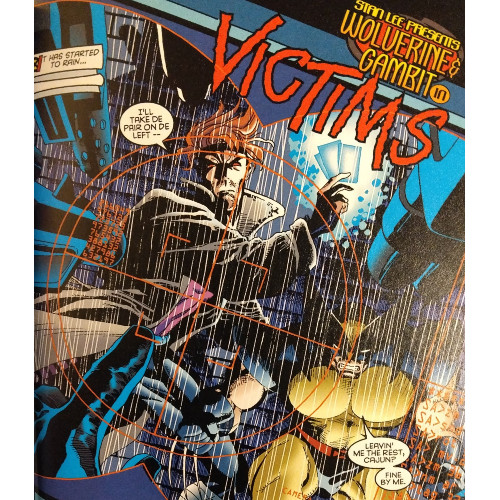
I referred to Loeb and Sale's Legends of the Dark Knight Halloween specials, in my review of the volume collecting them, as a prologue of sorts to The Long Halloween, not necessarily because those specials were a narrative prelude, but because they embodied the characters, styles, and themes heavily apparent in Loeb and Sale's magnum opus.
This four-issue limited series (which, I'll note, has been collected in a paperback subtitled "Victims"–I probably picked up this trade because I found it cheap somewhere) provides a similar reading experience, if not one which doesn't as readily indicate the promise of a bountiful collaboration between the men as their original Batman material.
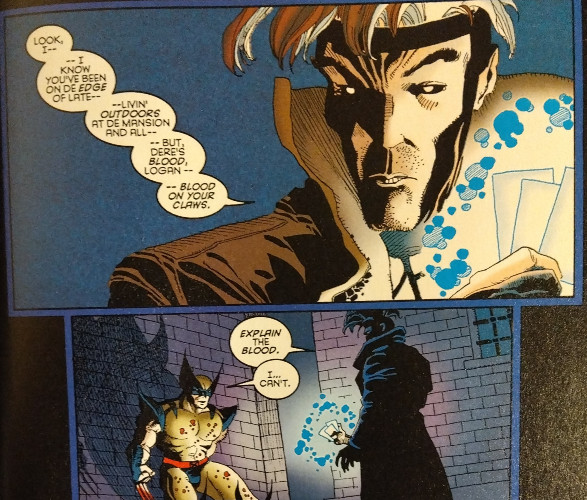
"Victims" isn't what I would consider a bad story, but it lacks a certain flavor and substance found more easily in Loeb and Sale's other collaborations. I complained before how, in their third Halloween special "Ghosts," Loeb ripped the plot of the issue largely from A Christmas Carol; though he doesn't crib a narrative from another source for this series, Loeb brings the knife-handed mutant and the card-throwing thief into the aura of a nasty British legend: Jack the Ripper! When a series of murders draws Remy to London, he soon finds himself in potential conflict with X-Men teammate Wolverine, accused for the murders because of their vicious nature. Like with "Ghosts," Loeb finds a fairly uninspiring basis to form a narrative, the British element feeling somewhat loosely tossed in and having little to do with the actual narrative.
Shades of later greatness proliferate here. Loeb wants to tell a murder mystery, and he wants to redirect both Remy and the reader's suspicions, but "Could Wolverine have actually killed innocent people???" is a remarkably lazy question to use in generating tension. You set yourself up for the obvious answers: either he did, but he was brainwashed and not responsible for his actions, or he was set up, and you know he and Gambit will sniff out the actual culprit. It lacks the tension a narrative like Long Halloween derives from the questions–when Batman suspects his friend Harvey Dent of being the Holiday killer, you trust his doubts in the D.A. His concerns and suspicions have weight, while Gambit's do not. Granted, Victims is a four-part series, so it's hard to compare to the latter's thirteen-issue heft. We just don't have enough time to become fully invested in the plot, our characters, or the tension created between them. Still, it's a rocky base to build upon.
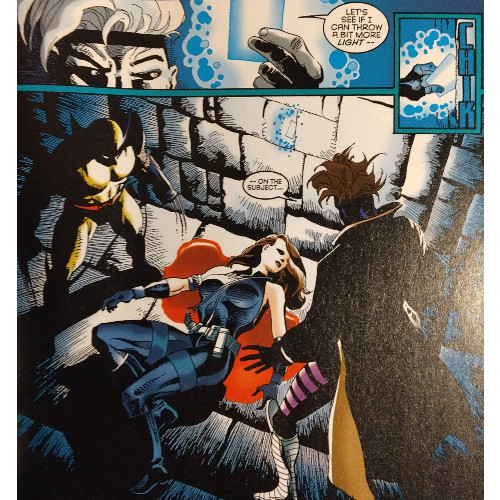
There are efforts made, especially by Loeb, to generate a level of humanity through our heroes and empathy for their individual situations. We find both men in relatively troubling spots in their careers and personal lives–Gambit is feeling some strain between himself and Rogue at this current period (and–woe is he–he's given up smoking!), and Wolverine is struggling with his more bestial side (like that hasn't happened before!). Loeb makes a bit of effort to showcase these men are misfits and are drawn together because of their losses, particularly with losing women they have loved. It's a fairly minor point, but Loeb doesn't attempt to stretch it far beyond believable. I honestly didn't feel the need to be motivated to appreciate a Gambit/Wolverine team-up, so I did enjoy even the small dive into their outward connections.
Loeb does strive to use the series' third issue to comment more heavily on his characters' mindsets, using a dream-like sequence to provide some additional time in their heads. It's a familiar trick Loeb has used in his Batman work, calling to mind sequences in both Long Halloween and one of his Sale's specials. Dreams, nightmares, illusions…they all enable Loeb to take a breather from the action and focus on who his characters are. Here, it's used somewhat effectively, creating space for both men to struggle internally with the people they've become, yet the circumstances around this moody, reflective period are murky and somewhat tossed in spontaneously.
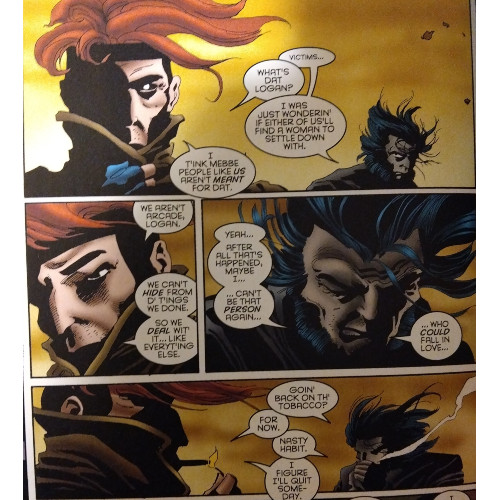
That describes a good chunk of the plot, if I'm being honest. A lot of it feels cobbled together in pieces Loeb either thought up on the fly or struggled to incorporate fluidly or effectively. Characters make dumb decisions to get the narrative moving forward, including the ever-so taunting "Wolverine loses his temper and charges somebody out of anger only to wind up embarrassed" trope (guy's been around literal centuries! You'd think he'd learn!). A fairly significant plot point–which, based on the physical appearance of one character, feels like a story beat Loeb knew he wanted from the start or at least early into the process–is teased until the final issue and then just explained abruptly. It's handled in such a fashion that I actually thought it was a follow-up from a previous comic and spent some time fruitlessly researching when that event may have happened outside this series, only to learn I just hadn't reached that point in the comic where it was explained.
Part of what makes Long Halloween–and, to a somewhat lesser extent, its sequel Dark Victory–engaging as it is is Loeb's methodical tugging of the plot. So much of those tales are intentionally, beautifully woven together, making multiple readings necessary to understand them fully, not because they're obtuse or needlessly complex, but because once you know the ending, you want to see how Loeb and Sale reach that conclusion. The same cannot be said for Victims, which plays with the murder mystery idea but in a way which feels unsatisfying. There are tricks and turns, sure, but none which surprise and a few which actually distract from what's happening.
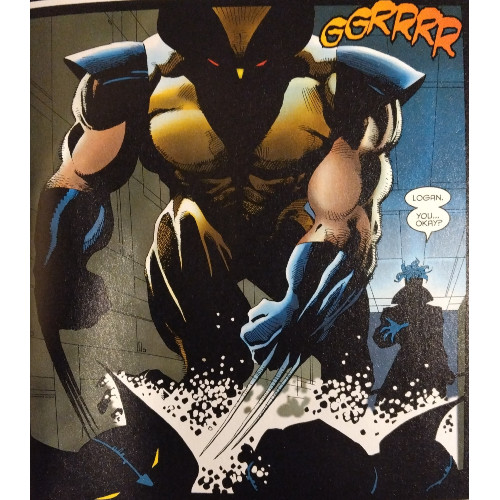
Artistically, Sale has grown significantly from his early work on Billi 99 and his and Loeb's Challengers of the Unknown (which I hope to review shortly); his style here is about the same as in the Halloween specials, providing men which look similar to Bruce Wayne and women who appear similar to Poison Ivy. Some folks may complain about such similarities, but I found comfort, as I always have, in Sale's stylistic options. His most unique looking character is Gambit, who he allows the most interesting facial expressions, and he toys nicely with shadows around Wolverine, strategically choosing when to light up the clawed Canadian's disgruntled visage and when to hide his face in darkness, creating a sinister anger lurking within the mutant through his piercing eyes. Here, too, shades of Long Halloween can be found, specifically through Arcade, who Sale draws with a scarred visage, calling to mind his later take on his facially disfigured Two-Face, and a wide grin, recalling Sale's exaggerated take on the wide-jawed Joker.
There's nothing about Victims which makes it overly memorable, which is a shame considering the prestige of the team involved. Not everything they created could be wonderful, I understand that. The duo really hit their stride following this narrative, with Long Halloween, Superman For All Seasons, and other collaborations at Marvel. I'm not sure how well this was received at the time, but it's telling you don't hear of the series in the same breath as some of their other works. If this had been the tale to put the Loeb/Sale team on the map, would they have returned to DC? Perhaps in an alternate universe, late 90s readers received the acclaimed Wolverine: The Short Christmas or Spider-Man: The Valentine Agenda. Maybe we're missing out on some really good comics, but rest assured, you won't miss much if you pass on this. It looks great, as does most everything Sale illustrated, but if you want to find this duo at the top of their game, check back in a few years after Victims was published.